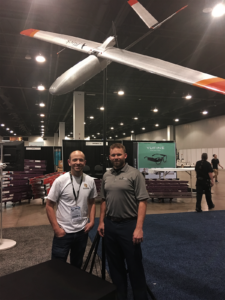
Announced at AUVSI’s EXPONENTIAL 2018 today, the Black Swift S2 UAS is being described as a “tightly integrated small Unmanned Aerial System (sUAS) specifically designed to meet the needs of atmospheric and earth-observing scientific field campaigns.”
The fruits of a partnership with NASA and University of Colorado (CU) Boulder Integrated Remote and In Situ Sensing (IRISS), the S2 platform encompasses airframe, avionics, and sensors specifically designed to measure atmospheric parameters such as temperature, pressure, humidity and winds; the system can hoist up to 5 pounds of additional payload.
“NASA, CU, and similar scientific agencies require deliverables with a high degree of accuracy and reliability,” Black Swift CEO Jack Elston said. “The Black Swift S2 is a purpose-built aerial platform specifically engineered for flying scientific payloads in demanding atmospheric environments and will enhance the performance and utility of any airborne science fleet.”
The S2 relies on the SwiftCore Flight Management System, described as “specifically engineered to meet the demanding requirements of nomadic scientific campaigns.”
Potential scientific uses for the S2 include measurement of soil moisture content, atmospheric volcanic phenomenon, and fire-conditions/weather, as well as providing satellite calibration via multispectral cameras. The platform is already being used by NOAA and NASA to gather data in harsh environments including tropical volcanoes, Arctic permafrost, and high Alpine ranges.
Scientists can program the S2 to collect data for analysis using a handheld Android Tablet loaded with BST’s SwiftTab software. Gesture-based controls allow users to deploy their Black Swift S2 with minimal training while being able to collect data over diverse geography.
“Our vision is to create a collaborative environment where we can be greater than the sum of our parts,” says Cory Dixon, IRISS Chief Technologist.
“By capitalizing on our strengths in aerospace engineering and earth sciences together with Black Swift Technologies advanced flight management avionics, sensor integration and their purpose-built scientific research airframes, we can support a wide range of atmospheric science initiatives at a time where rapid technological advances keep many of these capabilities out of reach of typical researchers and scientists.”
Jason is a longstanding contributor to DroneLife with an avid interest in all things tech. He focuses on anti-drone technologies and the public safety sector; police, fire, and search and rescue.
Beginning his career as a journalist in 1996, Jason has since written and edited thousands of engaging news articles, blog posts, press releases and online content.
Email Jason
TWITTER:@JasonPReagan
Subscribe to DroneLife here.